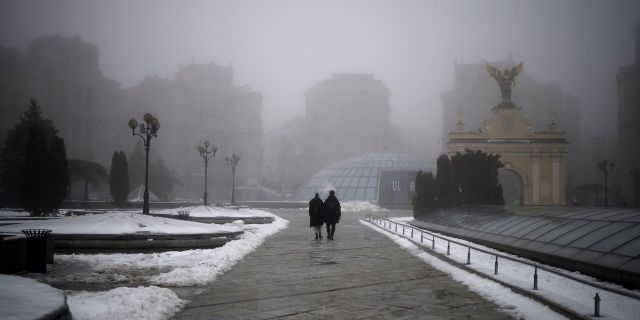The Economist suggests paying attention to ten trends in 2023In the coming months, the world will face attempts to curb inflation, chaos in energy markets and uncertainty about which way China will go after the pandemic.
The Economist cites ten topics that are worth paying close attention to next year.
Tom StandageAfter two years under the sign of a pandemic, the conflict in Ukraine has become the main driving force determining the near future.
In the coming months, the world will face its unpredictable impact on geopolitics and security, attempts to curb inflation, chaos in energy markets and uncertainty about which way China will go after the pandemic. As if to complicate the task, all these issues are closely interrelated, like gears. Here are ten topics and trends that you should pay close attention to next year.
1. All attention to Ukraine. Energy prices, inflation, interest rates, economic growth, food shortages — everything depends on how the conflict develops in the coming months. Ukraine's rapid successes may become a threat to Vladimir Putin, but the most likely outcome seems to be a stalemate. Russia will try to prolong the conflict in the hope that energy shortages and political shifts in America will deprive Kiev of Western support.
2. A recession is coming. Major world economies will fall into recession, and central banks are already raising interest rates in the hope of curbing inflation — a consequence of the pandemic and the result of a jump in energy prices. And if the recession in America is relatively mild, then Europe will be dealt a severe blow. In general, the whole world will feel the pain, and the strongest dollar will hit poor countries that have already suffered from the high cost of food.
3. A glimmer of climate hope. To replenish their energy reserves, countries are massively returning to dirty fossil fuels. But in the medium term, the fighting will accelerate the transition to renewable energy sources, and they will become a safe alternative to hydrocarbons from dictatorships. In addition to wind and sun, nuclear power and hydrogen are waiting for growth.
4. Is China at its peak? Sometime in April, India will overtake China in terms of the number of inhabitants, and its population will be 1.43 billion. As China's population shrinks and its economy is beset by difficulties, disputes will flare up over whether it has reached its apogee and has begun to run out of steam. And if economic growth declines, it will mean that China will never surpass America.
5. The split in America. Although Republicans performed weaker than expected in the midterm elections, public and cultural differences on abortion, guns and other sensitive issues will only worsen after a series of controversial Supreme Court rulings. The official entry of Donald Trump into the presidential race of 2024 will add fuel to the fire.
6. New hot spots. Constant attention to the conflict in Ukraine exacerbates the risk of conflict elsewhere. While Russia is distracted, conflicts flare up in its backyard. China may decide that it will not have a better opportunity to act against Taiwan. Tensions between India and China may flare up in the Himalayas. And what if Turkey tries to seize a Greek island in the Aegean Sea?
7. Alliances change contours. Global alliances are responding to geopolitical shifts. Two new members will join NATO, which is animated by the conflict in Ukraine. Will Saudi Arabia join the emerging bloc called the Abraham Agreement? In addition, the importance of the Quadrilateral Dialogue on Security and AUKUS (these two clubs under the leadership of the United States are designed to fight back against China) and I2U2 is growing — do not confuse: this is not a rock band, but a forum on sustainable development with the participation of India, Israel, the United Arab Emirates and the United States.
8. Tourist revenge. Get it, covid! Against the background of a general desire to get even for quarantines and closed borders, travelers' expenses will almost return to the level of $1.4 trillion in 2019 — but partly due to inflation and rising prices. The actual number of international tourist trips (approximately 1.6 billion) it will never exceed the 2019 pre-pandemic level of 1.8 billion. Business trips will remain modest as companies cut costs.
9. Reality check for the metaverse. Will the idea of work and games take root in the virtual world? Facebook Instagramm will partly answer this question: Apple will release its first headset, and Meta (Meta activity (social networks Facebook and Instagram) is banned in Russia as extremist - approx. InoSMI) will decide whether to change the strategy or not in response to cheaper stocks. Meanwhile, the shift is easier and more useful may be the arrival of "access keys" to replace passwords.
10. In the new year with a new slang. Never heard of access keys? Don't be afraid! We have collected key vocabulary that will be useful to master in 2023. The "Just not with us" approach with the abbreviation NIMBY will be replaced by "Chur, we have more" (YIMBY), and post-quantum cryptography will come into fashion. Are you sure you have a good idea of what a frozen conflict and synthetic fuel are? If anything, please contact.
Looking back, the pandemic marked the end of a period of relative stability and predictability in geopolitics and economics. Today's world has become much more shaky, it is shaken by the rivalry of great powers, the echoes of the pandemic, economic shocks, extreme weather conditions, rapid social and technological changes and other vicissitudes. Unpredictability is the new normal, and there's no getting away from it.

